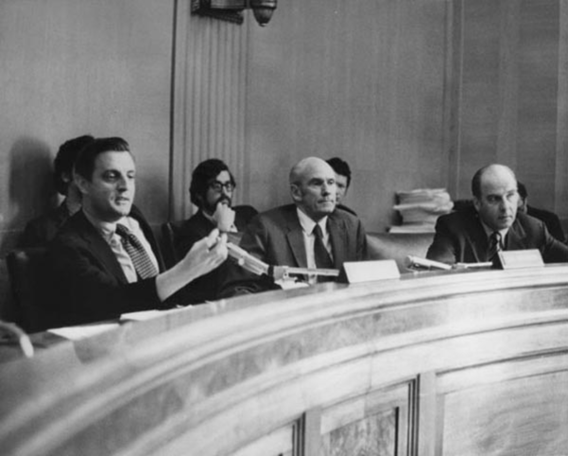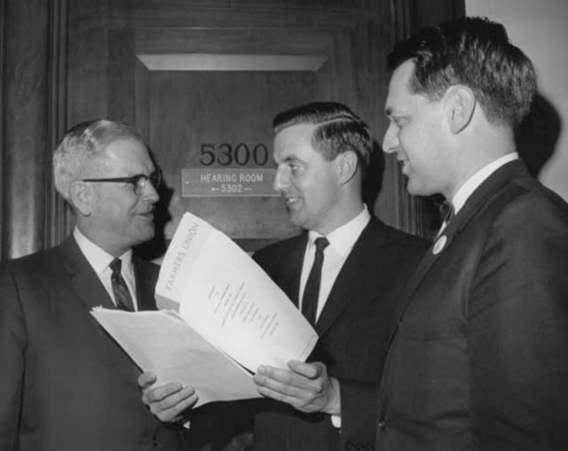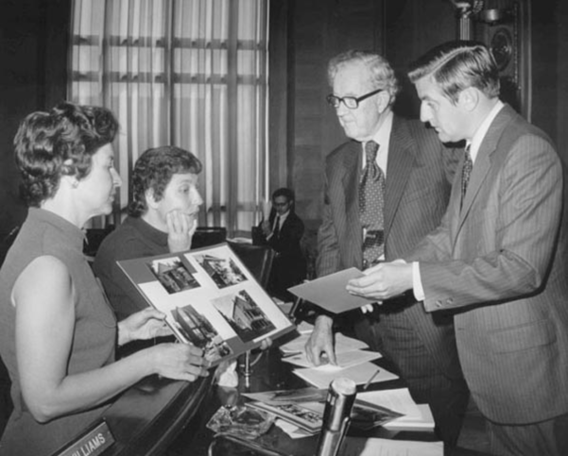Excerpt 1

"The greatest promise of America has always been the unqualified assurance of equal opportunity for all people regardless of their background or circumstances. We have made it a fundamental principle that every American be afforded the chance to build a full life for himself and his family.
Today in America there are a wide range of programs and projects to guarantee that no one is denied this chance because of race, because of a lack of education, or because of the poverty of his birth.
But today opportunity is closed to many of our fellow Americans because of the economic decline of the area in which they live. In such distressed areas, which spread throughout the country, young people leave school early to help their families and thus rob themselves of the skills and knowledge needed for a full and rich life. These same young people leave the area entirely, stripping it of the youth and vigor necessary to fight its economic problems. These circumstances and others lead to blocked progress and further decline.
We simply cannot afford to waste our human and natural resources. Loss of economic power stunts national growth and inhibits our position as the leading nation in the world community.
Most of all, we cannot sit contentedly by and allow millions of Americans to be foreclosed from the fulfillment of hope that the rest of us share. This would deny the American promise I spoke of earlier-the unqualified assurance of equal opportunity for all." U.S. Congress. Senate. Committee on Banking and Currency. Public Works and Economic Development: Hearings Before the Subcommittee on Production and Stabilization. Titles II and IV of S. 1648. 89th Cong., 1st sess., May 4, 5, 6, and 7, 1965 at 93.
Excerpt 2
"Losing sight of people, even while trying to improve their situation, will cause the antipoverty effort to fail more certainly than anything else. The human being is the target of our effort. We must not forget that individual men, women, and children, living with little hope for a better tomorrow, are the only reason for the Economic Opportunity Act." 90th Cong., 1st sess., Congressional Record 113 (September 11, 1967) at 25038.
Excerpt 3

"How many Americans suffer in the squalor of inadequate housing? How many children do not receive educations commensurate with their abilities? To how many citizens is equality of justice denied? How many convicts in our penal institutions are barred from rehabilitation that would allow them the opportunity to reenter the mainstream of life? How many physically handicapped and mentally retarded are unable to get training to achieve their potential? How many individual Americans are denied adequate health care? How many are breathing polluted air? These are some of the possible indicators that might be considered in the social accounting." 90th Cong., 1st sess., Congressional Record 113 (February 6, 1967) at 2654.
Excerpt 4
"Many are the paradoxes in this country. But to me none is more appalling, or less forgivable, than the paradox of hungry poor in this land of plenty.
This Nation of voluntary dieters has thousands condemned to forced fasting every day;
This Nation of food fads has thousands sick for lack of protein and vitamins they cannot afford;
This Nation that spends billions to keep food off the market has perhaps 10 million people whom the choice is beans and biscuits, or no food at all." 90th Cong., 2nd sess., Congressional Record 114 (May 16, 1968) at 13671.
Excerpt 5
"I believe that the season for stumbling is over. I fear, as many others do, the consequences of continued legislation enacted on hunch and intuition. I believe we must begin now to develop prudent and practical programs designed to enhance the opportunities of all Americans for personal fulfillment, and institutions capable of answering positively when Congress asks which program works best to achieve a given goal." U.S. Congress. Senate. Committee on Labor and Public Welfare. Full Opportunity Act: Hearings Before the Special Subcommittee on Evaluation and Planning of Social Programs. 91st Cong., 1st sess., July 7, 1969.
Excerpt 6

"It is indeed ironic that while some men are mobile enough to travel to the moon others lack the mobility to travel out of their ghetto. That we know more about extraterrestrial mobility than intrasocietal mobility is today all too evident and unfortunate. We can no longer afford-in any manner-the luxury of such relative ignorance. To say 'I don't know' is not a satisfactory response to the social problems which now confront us. While knowledge is not a sufficient condition for problem solving, it is a necessary condition. We need both the desire and the competence to solve these problems associated with equal opportunity. We cannot realize our ideal of equal opportunity unless we have an open society-a society which affords and stimulates rather than denies and frustrates social mobility." 91st Cong., 1st sess., Congressional Record 115 (February 25, 1969) at 4461.
Excerpt 7
"High quality comprehensive health services should be the right of all Americans, not the privilege alone of those with the ability to pay for them." 90th Cong., 2nd sess., Congressional Record 114 (October 8, 1968) at 30066.
Excerpt 8

"The price of equal justice is adequate legal counsel, and the cost of adequate legal counsel, for many Americans, is prohibitive." 91st Cong., 1st sess., Congressional Record 115 (August 11, 1969) at 23312.
Excerpt 9
L[egal] S[ervice] P[rogram] lawyers are the shock troops of the war on poverty, fighting at the cutting edge of social change. LSP lawyers have an opportunity unique among their colleagues to help the poor escape the treadmill of poverty. At the same time, they can enrich and influence the rule of law through development of new principles and practices reflecting the special needs of the poor." 91st Cong., 1st sess., Congressional Record 115 (March 4, 1969) at 5125.
Excerpt 10
"While legal services has survived past attacks on its independence and integrity, each challenge has drained its energy and resources. As long as the program remains vulnerable to political attack or manipulation, this damage will grow worse until it could be fatal.
No attorney can meet his professional responsibilities if there are outside restraints on cases or issues he can raise. No large corporation would tolerate such outside interference. The poor should not have to tolerate it.
If legal service lawyers are not free from all political pressures, if they cannot represent their clients without interference from vested interests, then legal services for the poor is a sham." U.S. Congress. Senate. Committee on Labor and Public Welfare. Economic Opportunity Amendments of 1971 (Legal Services Program): Hearings Before the Subcommittee on Employment, Manpower, and Poverty. 92nd Cong., 1st sess., May 11, 1971.
If legal service lawyers are not free from all political pressures, if they cannot represent their clients without interference from vested interests, then legal services for the poor is a sham." U.S. Congress. Senate. Committee on Labor and Public Welfare. Economic Opportunity Amendments of 1971 (Legal Services Program): Hearings Before the Subcommittee on Employment, Manpower, and Poverty. 92nd Cong., 1st sess., May 11, 1971.
Excerpt 11
"Last night in an action which I thought was unbelievable, the Senate passed a bill which would prohibit legal services attorneys from bringing a suit under the Social Security Act, which would mean they could not participate in any of the welfare fields at all. No matter how illegal, no matter how outrageous the violation, they cannot sue on behalf of poor people....
I would like to have some who voted for that provision go out and tell those poor people about our deep commitment here to law and order and to the Constitution-after we said, in effect, that the courthouse door is slammed shut, bolted, and nailed down as far as their rights are concerned. They better find a rich friend." 92nd Cong., 2nd sess., Congressional Record 118 (October 6, 1972) at 34269.